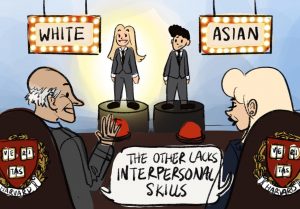Editorial: Response to outbreak calls for corroboration
An illustration depicting the reassuring power of being informed in the midst of the COVID-19 outbreak.
March 7, 2020
With over 75,000 cases across 26 countries, as of Feb. 19 according to the World Health Organization (WHO), a novel coronavirus, COVID-19, has raised health concerns, caused city-wide shutdowns and made headlines around the world. On Jan. 31 just as the outbreak was escalating, the panic hit home, with two confirmed cases in Santa Clara County that weekend.
Across news media and social media alike, fear has characterized coverage of the COVID-19. In some cases, that fear took form in rumor and discrimination. Hashtags like #ChineseDontComeToJapan and accusatory, ill-informed posts about Chinese culinary subculture have followed at the heels of each WHO report, often inflating the reality of the statistics with rumors.
This manifestation of public panic has only exacerbated the situation. Scientists currently know little about the disease, and misinformation during such a health crisis is especially problematic. Part of the global response to COVID-19 has been characterized by the uncertainty and foreignness surrounding the disease, but speculation foments rumors rooted not in fact but in fear. These rumors have become part of the problem, clouding the true magnitude of the outbreak.
In times of panic, we can only calm such fears with fact. Our ability to confront difficulty depends on an accurate assessment of the danger at hand, and unfounded fear does us no favors in that regard. Before panicking, we need to first understand the true extent of the problem and adjust our response accordingly.
As journalists, we always remind each other, “If your mother says she loves you, check it out.” During our coverage of the COVID-19 outbreak, we kept this saying in mind, checking and rechecking our information as part of our duty as press to bring accurate and reliable facts to our readers. And now, we ask you to do the same and help us as informed readers — don’t spread hearsay and please dispel rumors whenever possible.


















![“[Building nerf blasters] became this outlet of creativity for me that hasn't been matched by anything else. The process [of] making a build complete to your desire is such a painstakingly difficult process, but I've had to learn from [the skills needed from] soldering to proper painting. There's so many different options for everything, if you think about it, it exists. The best part is [that] if it doesn't exist, you can build it yourself," Ishaan Parate said.](https://harkeraquila.com/wp-content/uploads/2022/08/DSC_8149-900x604.jpg)




![“When I came into high school, I was ready to be a follower. But DECA was a game changer for me. It helped me overcome my fear of public speaking, and it's played such a major role in who I've become today. To be able to successfully lead a chapter of 150 students, an officer team and be one of the upperclassmen I once really admired is something I'm [really] proud of,” Anvitha Tummala ('21) said.](https://harkeraquila.com/wp-content/uploads/2021/07/Screen-Shot-2021-07-25-at-9.50.05-AM-900x594.png)







![“I think getting up in the morning and having a sense of purpose [is exciting]. I think without a certain amount of drive, life is kind of obsolete and mundane, and I think having that every single day is what makes each day unique and kind of makes life exciting,” Neymika Jain (12) said.](https://harkeraquila.com/wp-content/uploads/2017/06/Screen-Shot-2017-06-03-at-4.54.16-PM.png)








![“My slogan is ‘slow feet, don’t eat, and I’m hungry.’ You need to run fast to get where you are–you aren't going to get those championships if you aren't fast,” Angel Cervantes (12) said. “I want to do well in school on my tests and in track and win championships for my team. I live by that, [and] I can do that anywhere: in the classroom or on the field.”](https://harkeraquila.com/wp-content/uploads/2018/06/DSC5146-900x601.jpg)
![“[Volleyball has] taught me how to fall correctly, and another thing it taught is that you don’t have to be the best at something to be good at it. If you just hit the ball in a smart way, then it still scores points and you’re good at it. You could be a background player and still make a much bigger impact on the team than you would think,” Anya Gert (’20) said.](https://harkeraquila.com/wp-content/uploads/2020/06/AnnaGert_JinTuan_HoHPhotoEdited-600x900.jpeg)

![“I'm not nearly there yet, but [my confidence has] definitely been getting better since I was pretty shy and timid coming into Harker my freshman year. I know that there's a lot of people that are really confident in what they do, and I really admire them. Everyone's so driven and that has really pushed me to kind of try to find my own place in high school and be more confident,” Alyssa Huang (’20) said.](https://harkeraquila.com/wp-content/uploads/2020/06/AlyssaHuang_EmilyChen_HoHPhoto-900x749.jpeg)














